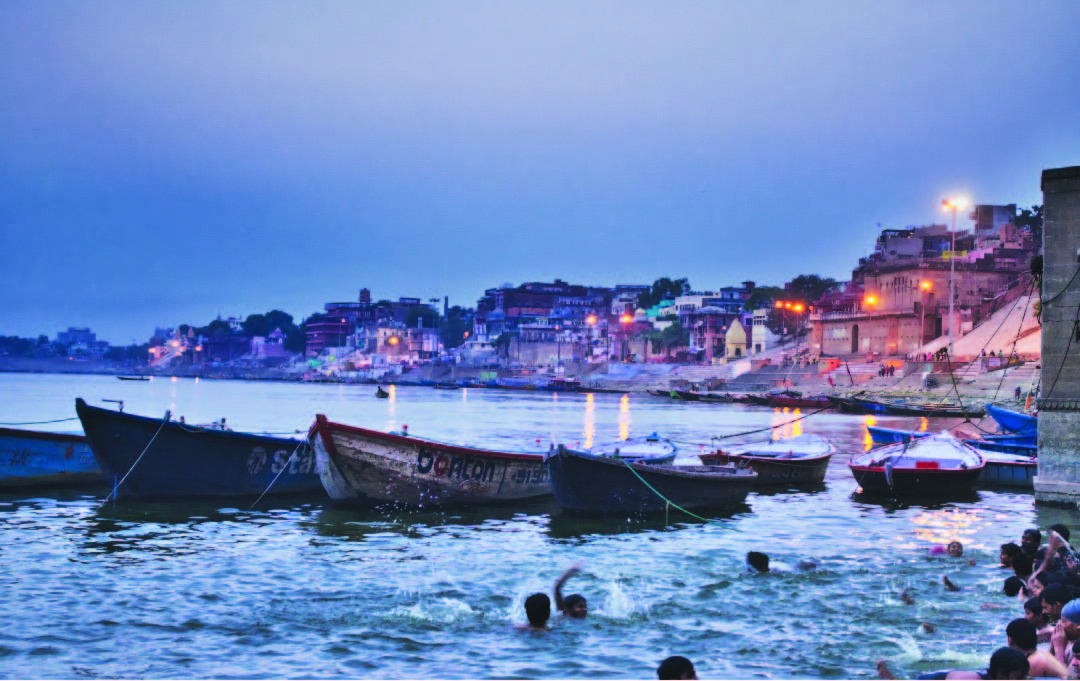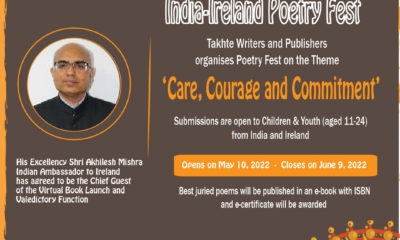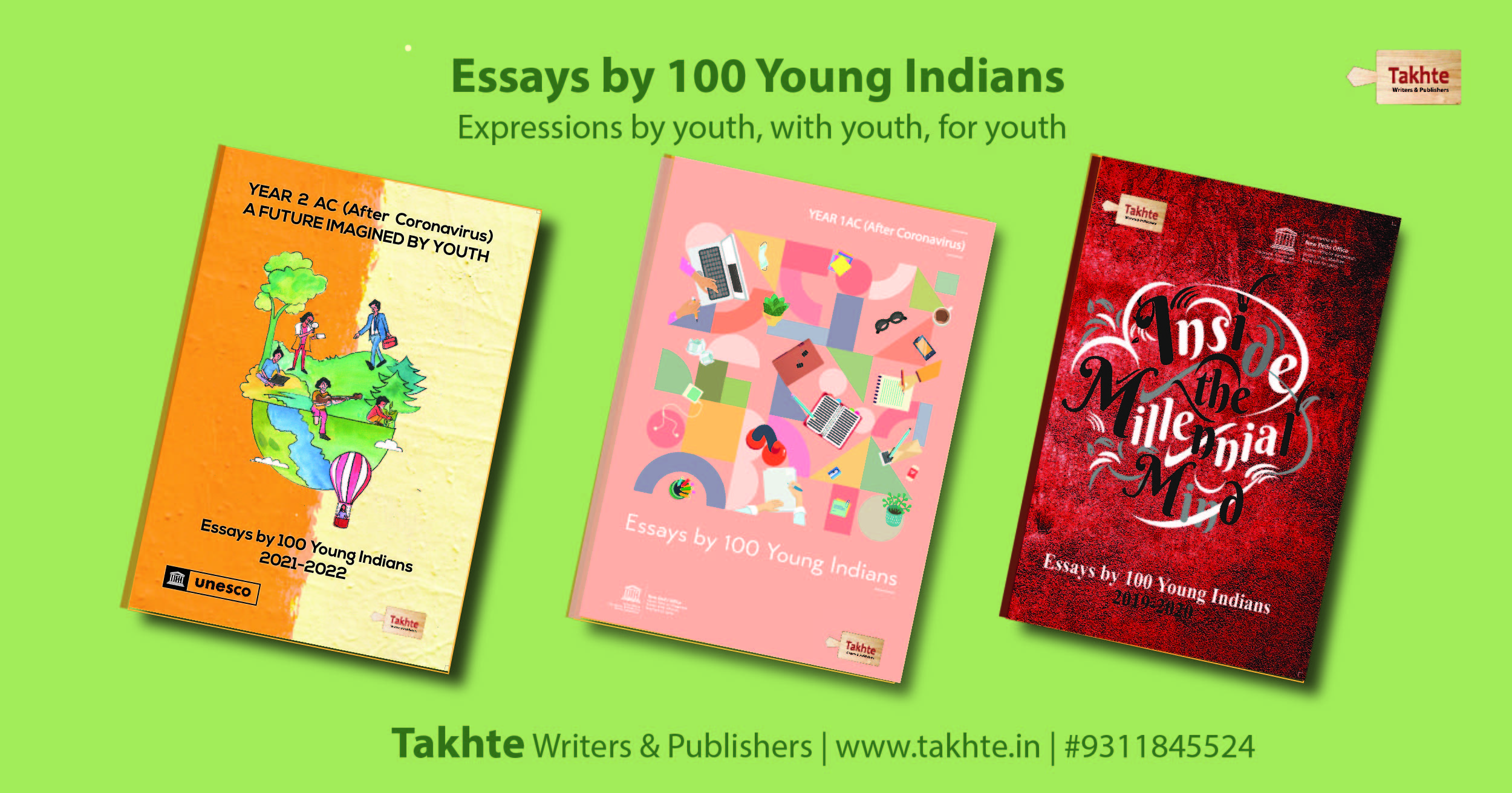Simply Express
Why can’t you stay quiet?

Sai Snigdha Kodali
Azim Premji University, Chennai, Tamil Nadu
I remember this one episode vividly when I had to give a speech in front of my class. I was talking out loud about Donald Trump and how The United States of America could be affected by abiding a republican party. I was 13 years old then, and I was given a vague topic of “current affairs.”
Then, after I ended my speech, I looked up to my teacher who was agitated. Flustered. She uttered “Why can’t you stay quiet? You can’t talk about this.”
My hands were trembling and I was on the verge of crying. The idea of me doing something wrong was almost devastating to her and me. Essentially, scary. Instead of being rational, I dug a deep hole in the path I was walking on and started burying myself in it. I was extremely afraid to talk about corruption or news, due to the consequences I’d face if I slipped an unpopular opinion or two.
I didn’t realize I was restricting myself. I put a figurative tape on my mouth to stop talking about things young kids aren’t supposed to talk about.
Fast forwarded to a year, the ICSE boards was in the process, and there was a mock speech evaluation going on. It was my turn next. I introduced myself and started speaking about something one would never expect to hear in school. Especially in an Indian School. You see, the topic was “Describe a law in the Indian Constitution that needs to be looked into.” So, I chose section 377.
Growing up in a predominantly homophobic society, I was introduced to trans women as someone who begs for money and validation in society. That’s what the 12 y/o version of me saw of them. Gay was used as an insult.
What’s worse is that the insults were homophobic with a humble serving of toxic masculinity.
According to the so-called “laws of nature”, love is unavoidable. Be it between a guy or a girl or trans or cis. Love is love and no one can change that.
As I uttered that forbidden abbreviation, I distinctly remember looking at people gasping.
After letting out all my pent-up anger in the form of a rant/speech, I felt relieved. You know the feeling you get when you rip out a band-aid and look at your healed wound? That.
Why do I speak about stuff too political, you ask? It’s because I can. I’m not held down by the hidden veins of society and I will use that to my advantage. Someone has to.
Public speaking is something near to my heart. As an introvert, and a socially awkward person, writing and public speaking is the only way I can converse with people. The way I can socialize. Although, I stumble and stutter, at the end of the day I’m proud of myself. I don’t have anything left in the back of my head anymore. It’s more peaceful there.
I’m talking about political stuff because someone my age has to. All we’ve been doing is hiding behind the curtains when we are destined to be in the center. The spotlight.
Youth impacts the world too, remember?
Simply Express
Literary Writers Can Help Prevent Child Abuse

By Goldie Kasturia
The literary writings give textual acknowledgement to the social happenings and issues and effectively contextualise the social dichotomy, bringing forth the belief that a positive change can be envisioned if the communal conscience is awakened to evil acts. According to the statistics and research, child abuse is a significant problem in our country. It is a critical veracity that children are mistreated every day by adults meant to love and care for them. Literary writings can contribute to overcoming the gradual decline. Through it, change is necessitated regarding the social incidents that are grimly plunging deep morally and ethically and affecting the innocent population physically and mentally. Writings should discuss more, allowing children to blossom and experience the joys of childhood.
Literary authors have social and political responsibilities. As they are mind makers and mind changers, their works can profoundly impact and encourage a sense of responsibility in avid readers’ minds. Moreover, literature is predominantly swayed by society and reflects it. It is imperative for sustained growth and reformed social values. Child abuse should not be neglected and overlooked concern but rather a forayed issue as both rural and urbanites are inflicted. Literary writers should achieve the objective of tapering the widespread social problem of child abuse by forcefully discussing it in their work. The literary community should support addressing the brutal reality sharply and severely.
Child incest has no parameters as it happens across nationalities, castes, classes, and ages. However, we still need to understand the impact of severe and despicable crimes against innocent children. These victims carry the scars all their lives, though some people are still in denial about it. Monsoon Wedding (2001), the popular movie released by Canadian producer/director Mira Nair, depicts the crime in an upper-class family. This is taken as a widespread problem in Indian society.
Child sexual abuse is, unfortunately, witnessing a high rise. Even the National Human Rights Commission, in its report on Children in India & Their Rights, has categorically listed its measures adopted in administering media, both print and electronic, in addressing child sexual abuse. They have taken out ‘A Guidebook for the Media on Sexual Violence against Children.’
Literary writers should profoundly take the responsibility of informing their readers because then the whole community will be enlightened. Third-generation English Indian writers have raised child abuse in their writings, but the need is to focus more on it. Contemporary realistic novels for children are dreadful for readers of all ages when child abuse is a severe concern in the story. It is a known fact that childhood is cherished and full of fun, amusement, and freedom. The books on quarrels, trivial school problems, or the rivalry between friends or siblings are common. However, the writers discussing the serious issues children undergo, such as bullying, maltreatment, and problems related to the divorce of parents or their deaths, is uncommon. Fictions with these issues can be crucial, as such literary works are potent conveyors of messages; they can be inspiring, encouraging, informational, and potentially life-changing for abused children. Few writers have focused on the consequences of the indifference of people towards violence against the child, while some have depicted how the abused child feels and how he/she can overcome the problems. Both adults and children should read realistic novels that emphasise the adults’ role in addressing issues related to child abuse.
Simply Express
Child Abuse in Indian English Literature

By Goldie Kasturia
Indian English literature has radically contributed to world literature. The Indian English writing is both innate and imbibed, as it has come to the fore by coming across the East and the West. The literature of a country where it originated is closely related to the traditions, languages, cultural heritage, histories, and experiences; however, Indian English literature is more associated with a colonial encounter, as a critic has remarked: “The literature written in English has an altogether different history and is linked with the global process of colonization. However, it has also grown out of an Indian ethos and is responsive to the changing conceptions of Indian nationalism and self-interest.”
Litterateurs powerfully focus on political, social, and economic struggles. Writers from the earliest stages of Indian English writing like Bankim Chandra Chattopadhyay, Sri Aurobindo, and others were treating their writing as a document for social change and as a weapon of the nationalistic struggle. This idea was taken up by the early greats of Indian English fiction, namely Mulk Raj Anand, R.K. Narayan, and others who used their work as an attempt to portray social truths and as a vehicle of change and reform.
The Indian English novel in its present state has overcome the clichés, emerged from the limited sphere, become confident, and attained maturity and a certain universal status. The Indian writers of the post-independence era adopted English as a tool and in its varied innuendoes to express widely differing cultural experiences. In works like Rushdie’s Midnight’s Children and Arundhuti Roy’s The God of Small Things, the creative and imaginative use of the language of the coloniser shows how these writers use the language as a dynamic medium to explore the complex Indian reality.
The third generation’s Indian writings in English have enlightened the literature with its quality and vividness[i]. And have concentrated their themes around social content—particularly in its representation of the conflict between the individual and the community. Although the writings profoundly deal with regionalism, they crossed the natural boundaries with universal themes, including feminine subjects, science and technologies, explorative writings, and much more. Under socio-issues, child sexual abuse finds an elaborative mention. Further, dealing with child incest, the writings throw more light on the effects of forced sexual relations on the individual’s psyche, which gets intensified with time.
When the renowned poet of English literature P.B. Shelly wrote, “If winter comes can spring be far behind,” he was not possibly talking only about the change of seasons but also about the fact that change is the law of nature and it has to happen sooner or later, and yes, sometimes it comes with a heavy price. Children and adolescents, irrespective of their race, culture, or economic status, appear to be at approximately equal risk for sexual victimisation [ii]. Child sexual abuse is outlawed nearly everywhere in the world, generally with severe criminal penalties, including, in some jurisdictions, life imprisonment or capital punishment. An adult’s sexual intercourse with a child below the legal age of consent is defined as statutory rape based on the principle that a child is not capable of consent and that any apparent consent by a child is not considered to be legal consent. Child Sexual abuse is engaging a child in any sexual activity that he/she does not understand, cannot give informed consent for, or is not physically, mentally, or emotionally prepared for. This includes using a child for pornography, sexual materials, prostitution and unlawful sexual practices. The United Nations Convention on the Rights of the Child (CRC) is an international treaty that legally obliges states to protect children’s rights. Articles 34 and 35 of the CRC require states to protect children from all forms of sexual exploitation and sexual abuse. Accurate statistics on the prevalence of child and adolescent sexual abuse are difficult to collect because of problems of underreporting and the lack of one definition of what constitutes such abuse. Nineteen percent of the world’s children live in India, which constitutes 42 percent of India’s total population. A total of 33,098 cases of sexual abuse in children were reported in the nation during the year 2011 when compared to 26,694 reported in 2010, which increased by 24%. It is estimated by the government that 40% of India’s children are susceptible to threats like being homeless, trafficking, drug abuse, forced labour, and crime. In India, every second child is being exposed to one or the other form of sexual abuse and every fifth child faces critical forms of it. [iii] The effects of child sexual abuse can include depression, post-traumatic stress disorder, anxiety, propensity to further victimization in adulthood, physical injury to the child, and many other problems. Sexual abuse by a family member is a form of incest and can result in more serious and long-term psychological trauma, especially in the case of parental incest. In 2007, the Ministry of Women and Child Development published the ‘Study on Child Abuse: India 2007’. The study’s main findings suggest that 53.22% of children reported having faced sexual abuse. Among them, 52.94% were boys and 47.06% were girls. The ‘Protection of Children against Sexual Offences Bill, 2011’ was passed by the Indian Parliament on May 22, 2012
Further, the U.S. Department of Health and Human Services (2008) claims, “While physical injuries may or may not be immediately visible, abuse and neglect can have consequences for children, families, and society that last lifetimes… The impact of child abuse and neglect is often discussed in terms of physical, psychological, behavioural, and societal consequences. In reality, however, it is impossible to separate them completely. Physical consequences, such as damage to a child’s growing brain, can have psychological implications, such as cognitive. Â delays or emotional difficulties. Psychological problems often manifest as high-risk behaviours, depression, and anxiety…”
If we consider some of the literary works of eminent writers like Akhil Sharma’s ‘Obedient Father’, which unfolds the story of a corrupt government official who repeatedly molests his daughter. Ram Karan, the antihero of Akhil Sharma’s novel, “An Obedient Father,” molested and raped his daughter when she was 12 years old. Ram would prefer that this skeleton stay in the closet, but now that his recently widowed daughter Anita and 8-year-old granddaughter Asha, have moved into his tiny flat, he’s somewhat short on closet space. This becomes especially difficult when the daughter catches her father developing an eye for his granddaughter. The close circle of relatives realises the need for Anita to leave her father’s house for her well-being and the safety of her daughter, but they also admit that homes “don’t grow on trees.” Literature reviews show that domestic violence takes on many forms, and here has prodded the author to focus on one of its many dimensions, and that is child abuse. The author categorically captures the sequences of how a child thinks that the happenings are circumstantial of her faults and relatively exposes the abuser’s tactics of domination by fear.
Mira Nair’s ‘Summer’ echoes Sharma’s focus on incestuous sexual abuse of children and challenges the silence that often protects the abuser. [iv] Arundhati Roy’s ‘God of Small Things’ is one of the most memorable and haunting books written in an innovative style [v]. A landmark in Indian English is not only for the celebration of the human spirit against cruelty and suffering but for the interesting manner in which the local is interwoven with the global. It discusses the abuse, exploitation, and neglect of girls and their rights in Indian society and how traumatic childhood experiences affect the perspective of a person towards life.
Child abuse is a major problem in our world today. It is a very sobering reality that children are being abused every day by adults who are meant to love and care for them. Along with the physical damage that is being done to children, there are also equally devastating emotional wounds created by harsh words or neglect.
[i] https://www.arcjournals.org/pdfs/ijsell/v3-i12/7.pdf
[ii] https://www.omicsonline.org/open-access/trace-evidence-analysis-in-a-child-sexual-abuse-case–silence-dares-to-speak-2157-7145-1000S4-001.php?aid=62197
[iii] https://www.ncbi.nlm.nih.gov/pmc/articles/PMC4311357/
[iv]http://www.academia.edu/9129499/The_Taboo_in_Indian_Literature_in_English_Expanded_Ways_of_Writing_and_Reading_Indianness_in_Essays_on_English_Language_Writers_from_Mahmoet_to_Rushdie_
[v] http://shodhganga.inflibnet.ac.in/bitstream/10603/67552/8/08_chapter%202.pdf
Photo courtesy: Artyom Kabajev on Unsplash
Simply Express
The pool in my backyard

Avni Singh
Podar World School Sama, Vadodara
My dad’s ever-changing job made us live almost everywhere except in India, our home country. We visited our extended family in India during the holidays, especially Varanasi, my hometown; they took us to the great river, the Ganges. The very first time when I travelled to the ghats (the steps leading to the river), I was excited to behold a spectacular sight of the river that takes away our sins with it. The Ganges, thronged by people from all corners of the subcontinent, serve as a water source for hundreds of villages and cities. I had heard several stories of the holy river from my grandparents. My cousins often bathed in it like a pool in our backyard.
I was utterly stunned and saddened to see the sight of the river. It was bursting with plastic bottles, flowers, polythene packets, and things I possibly could not describe. We returned without touching the water. Distraught with the thought of how a river considered holy, to be in such a state? I imagined that no one had tried to clean it up. Researching on it I found that Ganga Action Plan (GAP), launched in 1986, had tried cleaning it but did not achieve its high goals of preventing industries and sewage lines from polluting the river. So, during our visits in the later years, we just visited the Ganga as a ritual. I learned from my parents that the government had launched the Namami Gange program in 2014 to clean the river, and I hoped it would succeed.
The COVID-19 pandemic brought us back to India in 2020. Our relatives said that the Ganges looked cleaner as most industries were closed during the lockdown. There was a buzz in town that though COVID-19 made us suffer, it cleaned the river naturally. The river certainly looked clean from the outside. However, I had my doubts. So, I surfed online and came across reports of NGOs that work for cleaning the Ganges. They conduct water quality tests often and the recent results were shocking. The main reason for the pollution is untreated sewage water disposal into the river. The industrial wastes, leftovers due to religious activities, and land pollution runoff into the river add to the low water quality. Thus the river is not wholly cleaned. I am not proud of having a pool in my backyard but ashamed of not making any efforts to clean the great river that gives lives to millions of living beings.
Well, logically, after reading about the faecal material in the water, I had no intention of going into it. However, when we made a trip to the ghat this time, everyone except me was inside the water. As I watched, a man got in the knee-deep water and spit out a huge mouthful of well-chewed tobacco. My family watched this and rushed out of the water, not minding the cold at all. Then, he brushed his teeth and gargled in the same water. Finally, he bathed in it and worshipped the same river, which he polluted a few minutes earlier. We should all join hands and contribute to cleaning the river and the minds of the people who worship it but do not respect its sanctity.
( Photo by Shiv Prasad on Unsplash)
-

 Uncategorized3 years ago
Uncategorized3 years agoOnline Elocution Contest
-

 Poems4 years ago
Poems4 years agoPoems
-

 Legal Talks4 years ago
Legal Talks4 years agoCUSTODIAL RAPE IN LIGHT OF THE MATHURA GANG RAPE CASE
-

 Poems3 years ago
Poems3 years agoIndia-Ireland Poetry Fest
-

 Legal Talks4 years ago
Legal Talks4 years agoCompliances Relating to the Commercialization of Electronic Devices
-

 Art & Culture4 years ago
Art & Culture4 years agoThe Lore of the Days of Yore: Significance of History
-

 Legal Talks4 years ago
Legal Talks4 years agoPrivacy Laws & Consent while using Image of Random People Clicked on Street for Facial Recognition
-
Short-story4 years ago
Bibek’s visit at his friend’s bungalow

























